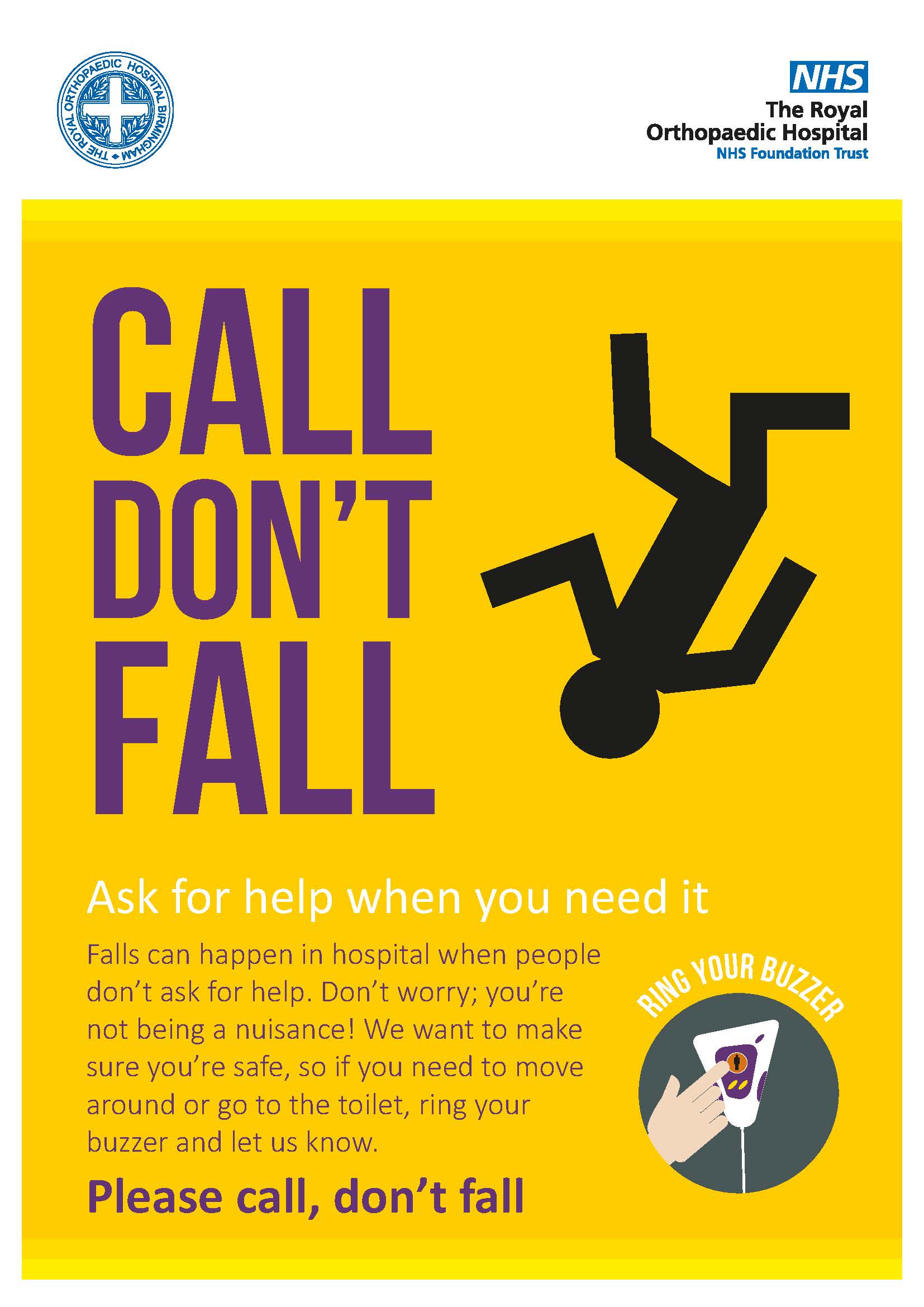
Falls Prevention Advice
Falls in hospital are the most commonly reported patient accidents. People may fall in hospital for a variety of reasons including:
- General weakness or balance problems
- Sudden changes in health
- Poor eyesight
- The effects of medications
- Slipping due to inappropriate footwear
- Disorientation due to unfamiliar surroundings
People who are recovering from surgery may be at higher risk of falling during this period.
What can you do to reduce your risk of falls?
Some of the following may help you to reduce your risk of falling whilst in hospital:
- Wear your glasses
- Use your night light
- Keep everything you need within easy reach, including your nurse call bell
- Use your nurse call bell to get help and wait for someone to attend to you
- Avoid stretching or bending to reach things
- Wear non-slip, well-fitting shoes or slippers
- Only use walking aids that you have been assessed as safe to use by the physiotherapist
- Only walk on your own if you have been advised by your physiotherapist it is safe to do so
- Avoid wearing clothes which may cause you to trip – ensure dressing gown chords tied up
Some tablets and medicines can also put you at a higher risk of falling, by causing dizziness. These include tranquillisers, anti-depressants, sleeping tablets and some heart tablets and pain medications. Therefore you should make sure you:
- Call for assistance if you feel weak or dizzy
- Ensure getting up from bed or chair slowly
- If any medicine is making you feel dizzy, please talk to your nurse as soon as possible
- Don’t try to do too much at once
- Drink plenty – staying hydrated can help reduce your risk of falls
Do not be afraid to ask for assistance when you need it
Advice for relatives, carers and other visitors
For the safety of patients, it would help us greatly if you would report to staff any possible problems you may have seen such as:
- Spills of liquids on the floor
- Trailing wires or cables
- Obstacles around the bed-space or ward area
We would also ask that you:
- Leave the patient’s room/bed-space tidy by replacing your chairs
- Take any unnecessary items home to increase bed-side space for patient
- Replace bed tables and call bells moved during your visit
- Ask nursing staff to replace bedrails if in use
If your relative/friend has had a fall or is at risk of falls, please help us by:
- Reminding them to be careful when moving
- Reminding them to use their walking aids in hospital
- Ensuring wheelchair brakes are on whenever someone is getting in or out
- Letting us know about a fall - if you’re relative or friend has had a fall whilst you are visiting, please tell a member of staff as a matter of urgency.
- We may need to do some first aid checks or use some equipment to help get your relative up and about again.
Preparing for home
Ensure the home environment is ready for your discharge from hospital:
- Remove any rugs
- Beware of any possible loose or broken paving stones in your garden or path
- Beware of any drain covers, small steps or other obstacles
- Plan ahead so there is no need to hurry
- Always take your medications as directed
Should you start to have falls, please discuss this with your GP as you may need a referral to local falls prevention service in your area
What are we doing to help reduce your risk of falls?
The Royal Orthopaedic Hospital NHS Trust takes patient safety and the reduction of the occurrence of falls very seriously. In accordance with guidelines supplied by the National Institute for Clinical Excellence (NICE), we aim to reduce your risk of falling during your hospital stay by:
- Training staff in falls management and prevention
- Giving advice in a simple and practical way
- Responding quickly to hazards brought to our attention
- Ensuring that the hospital environment is as safe as possible
- Regularly assessing and re-assessing each patient’s risk of falling and delivering care to manage any risks
- Providing anti slip anti embolic stockings
- Ensure your relative has well-fitting footwear and clothing with them
- Report to nursing staff any concern you may have if you think your relative or friend is disorientated or not themselves
The advice in this leaflet is designed to reduce the risk of patients in hospital having a fall or injury.
Despite everyone’s best efforts, some patients will continue to fall.
Sources of further information
- Age UK
- NICE
- NHS Falls Advice - www.nhs.uk/conditions/falls/
If you have a concern which the ward staff cannot address, please ask the nurse in charge or a member of staff to arrange contact with the hospital Falls Team Lead to discuss the management of falls (during office hours).
